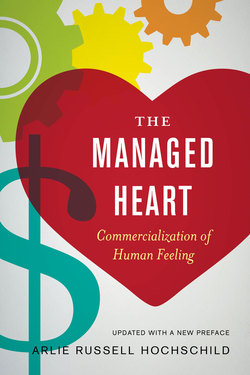Читать книгу The Managed Heart - Arlie Russell Hochschild - Страница 9
На сайте Литреса книга снята с продажи.
ОглавлениеPreface to the First Edition
I think my interest in how people manage emotions began when my parents joined the U.S. Foreign Service. At the age of twelve, I found myself passing a dish of peanuts among many guests and looking up at their smiles; diplomatic smiles can look different when seen from below than when seen straight on. Afterwards I would listen to my mother and father interpret various gestures. The tight smile of the Bulgarian emissary, the averted glance of the Chinese consul, and the prolonged handshake of the French economic officer, I learned, conveyed messages not simply from person to person but from Sofia to Washington, from Peking to Paris, and from Paris to Washington. Had I passed the peanuts to a person, I wondered, or to an actor? Where did the person end and the act begin? Just how is a person related to an act?
As a graduate student at Berkeley some years later, I was excited by the writings of C. Wright Mills, especially his chapter in White Collar called “The Great Salesroom,” which I read and reread, I see now, in search of answers to those abiding questions. Mills argued that when we “sell our personality” in the course of selling goods or services we engage in a seriously self-estranging process, one that is increasingly common among workers in advanced capitalist systems. This had the ring of truth, but something was missing. Mills seemed to assume that in order to sell personality, one need only have it. Yet simply having personality does not make one a diplomat, any more than having muscles makes one an athlete. What was missing was a sense of the active emotional labor involved in the selling. This labor, it seemed to me, might be one part of a distinctly patterned yet invisible emotional system — a system composed of individual acts of “emotion work,” social “feeling rules,” and a great variety of exchanges between people in private and public life. I wanted to understand the general emotional language of which diplomats speak only one dialect.
My search soon led me to the works of Erving Goffman, to whom I am indebted for his keen sense of how we try to control our appearance even as we unconsciously observe rules about how we ought to appear to others. But again, something was missing. How does a person act on feeling—or stop acting on it, or even stop feeling? I wanted to discover what it is that we act upon. And so I decided to explore the idea that emotion functions as a messenger from the self, an agent that gives us an instant report on the connection between what we are seeing and what we had expected to see, and tells us what we feel ready to do about it. As I explain for specialists in Appendix A, I extend to all emotions the “signal function” that Freud reserved for the emotion of anxiety. Many emotions signal the secret hopes, fears, and expectations with which we actively greet any news, any occurrence. It is this signal function that is impaired when the private management of feeling is socially engineered and transformed into emotional labor for a wage.
These questions and ideas were developing, then, when I went out to try to get behind the eyes of flight attendants and bill collectors, female workers and male, as each moved through a day’s work. The more I listened, the more I came to appreciate how workers try to preserve a sense of self by circumventing the feeling rules of work, how they limit their emotional offerings to surface displays of the “right” feeling but suffer anyway from a sense of being “false” or mechanical. I came to understand, too, that the more deeply a commercial system carves into the private emotional “gift exchange,” the more receivers and givers alike take up the extra work of discounting what is impersonal in order to accept what is not. I think all this has helped me interpret the smiles I now see around me at eye level.
A. R. H.
